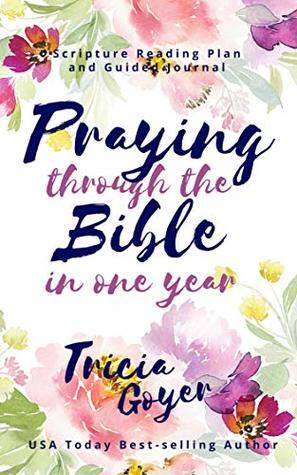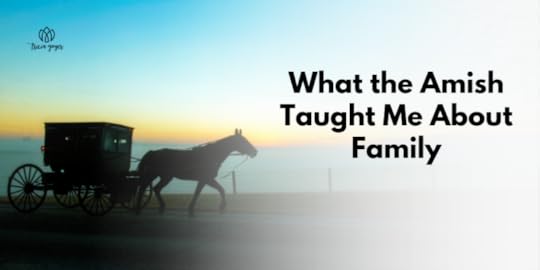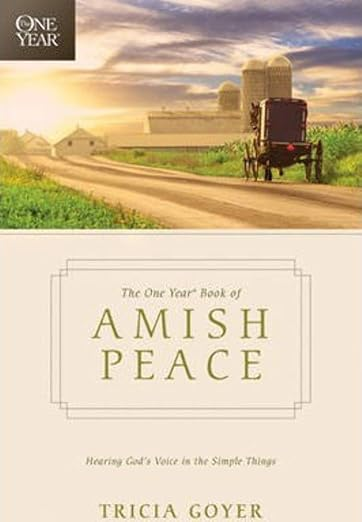Tricia Goyer's Blog, page 9
July 8, 2025
Why Serving Others Feels Hard
 Tricia Goyer
And How to Push Past the Fear
“Each of you should use whatever gift you have received to serve others, as faithful stewards of God’s grace in its various forms.” —1 Peter 4:10 (NIV)
Tricia Goyer
And How to Push Past the Fear
“Each of you should use whatever gift you have received to serve others, as faithful stewards of God’s grace in its various forms.” —1 Peter 4:10 (NIV)Have you ever noticed how hard it can feel to serve others? Whether you’re coaching someone toward better health, writing a book meant to encourage weary hearts, or simply trying to love your neighbor, the fear creeps in.
What if they think I’m pushy?
What if they roll their eyes?
What if they think I’m a fraud?
Serving feels heavy because we are so focused on ourselves .
But here’s the truth: people are desperate for hope, for change, for freedom — and you might hold the very answer they’ve been praying for.
That’s why your message matters. That’s why your story matters.
Your calling isn’t about your comfort. It’s about their breakthrough.
Every day, people are secretly Googling at 2am, searching for relief from pain, confusion, and shame. They don’t know what to do. They don’t know who to trust. But you could be the one who stands in the gap.
Maybe you’re worried you’ll come across as pushy.
But what if you come across as prepared?
What if you come across as compassionate?
What if they see you as the answer to a prayer?
Don’t let your worry about being “pushy” rob someone else of their freedom.
In the world of coaching, ministry, and even sales, most flops come down to a single issue:
The problem wasn’t clear or painful enough.
People don’t want your solution until they trust that you see their problem.
They want to know,
Do you see me?
Do you understand what I’m going through?
Over and over, He named people’s pain before offering healing. To the blind man, He asked, “What do you want Me to do for you?” (Mark 10:51). He could have assumed, but He didn’t. He let the man name the problem.
People need to name their pain. And they need you to see it through their eyes.
Why is that so hard?
Experts think in solutions, not problems.We try to sell the root cause, but customers only feel the symptoms.We forget how it feels to hurt, because we’re already on the other side.Friend, get the problem right.
If you miss the problem, you miss the chance to serve.
If you skip their pain, you skip their heart.
You can’t rescue someone from a pit you refuse to see.
Shift Your Focus to Serving OthersHere are three powerful questions to help you shift your focus and truly serve.
Coach Julie Chenell encourages us to ask these questions:
What’s the thing your ideal client or reader would Google at 2am?What’s the sentence they would never say out loud, but would breathe easier if you spoke it first?What pain keeps repeating, making them whisper, “Something must be wrong with me”?Romans 12:6 reminds us:
“We have different gifts, according to the grace given to each of us.”Your gifts — your story, your health journey, your ministry, your book — are meant to meet a specific need. You don’t have to be everything for everyone. Just be faithful in the lane God has placed you.
Serving isn’t about you. It’s about them.
Not to push. Not to pressure. But to invite them to freedom.
If you ever doubt, remember this: Someone is praying for the answer you already hold.
Don’t keep someone else’s miracle locked inside your silence.
Be bold enough to speak up.
Be kind enough to meet them where they are.
Be faithful enough to show them the hope you’ve found.
That’s how we change lives. That’s how we walk worthy of the calling God placed on us.
“Let us not become weary in doing good, for at the proper time we will reap a harvest if we do not give up.” —Galatians 6:9Keep going.
Keep serving.
Keep loving.
Their breakthrough is on the other side of your obedience.
Additional Resources Praying Through the Bible in One Year
Have you ever wanted to read through the Bible but found yourself giving up? Or even worse, you read the chapters and at the end question how they apply to your life. Tricia Goyer understands. For years she felt frustrated that she couldn’t stick to her commitment to read God’s Word all the way through. Things changed when she found a doable plan and wrote out a daily prayer. Tricia’s heart changed. Her life did, too.
God can bring real transformation into your heart and life when you daily commit to reading your Bible and praying through God’s Word. Praying through the Bible in One Year offers a guided reading plan and a daily prayer starter to help you make God’s Word applicable to your life. Discover the inspiration for real-life transformation.
Purchase a copy of Praying Through the Bible in One Year HERE!The post Why Serving Others Feels Hard appeared first on Tricia Goyer.July 7, 2025
Writing a Faith-Filled Script for Your Homeschool Family
 Tricia GoyerBecause your family deserves more than chaos—you deserve purpose, peace, and a plan rooted in Christ.
Tricia GoyerBecause your family deserves more than chaos—you deserve purpose, peace, and a plan rooted in Christ.Sometimes our family life feels like a movie. There’s laughter, tears, drama, and the occasional slow-motion meltdown over math worksheets. It can be beautiful, but also unpredictable and exhausting. We wish we could yell “Cut!” and reset the scene.

But here’s the thing—real life doesn’t wrap up neatly in 30 minutes like a sitcom. And yet, real life is better. Why? Because with God’s help, we can shape a family life full of grace, redemption, purpose, and peace.
 Dialogue: What’s Being Said (and Thought) Matters
Dialogue: What’s Being Said (and Thought) MattersAs homeschool parents, we speak thousands of words each day—to our kids, to our spouse, even to ourselves. The Bible reminds us:
“Death and life are in the power of the tongue.” – Proverbs 18:21 (NKJV)We build our children up—or tear them down—with the words we choose. This applies to the dialogue we speak aloud and the internal conversations we have in our minds.
Every day, we either:
Encourage our children with words of truth, or discourage them with sighs of frustration.Nurture their hearts by reminding them who they are in Christ, or let fear, pressure, or perfectionism guide our words.And it’s not just about our kids. Our inner dialogue matters too. What are we telling ourselves as homeschool parents?
Are we saying:
“I’m failing my kids.”“This is too hard.”“I can’t do this anymore.”Or are we replacing those thoughts with God’s truth?
 Script: What’s the Plan for Your Family?
Script: What’s the Plan for Your Family?Imagine a movie with no script. Chaos. Confusion. Wandering plotlines. No clear ending.
Now, think of your homeschool and family life. Without direction, your days feel scattered. You jump from chore charts to curriculum changes with no real compass. You may be surviving—but not thriving.
That’s why we need a script. Not a rigid routine, but a purpose-filled, Spirit-led plan that guides our words, actions, and choices.
Ask yourself:
Where is God calling our family?What kind of people are we raising?What rhythms will nourish our hearts and home?How can we create a Christ-centered atmosphere in our homeschool?God’s Word gives us the framework for that script.
“The heart of man plans his way, but the Lord establishes his steps.” – Proverbs 16:9 (ESV)“Commit your way to the Lord, trust also in Him, and He shall bring it to pass.” – Psalm 37:5 (NKJV) Writing a Faith-Filled Script for Your Family
Writing a Faith-Filled Script for Your FamilyHere are a few ways you can start shaping your family’s life script with intentionality:
Start with prayer. Invite God to direct your days. Ask Him to reveal His plans, not just your own.Speak truth over your family. Say out loud what God says in His Word about your kids, your calling, and your future.Write a vision statement. What kind of adults do you want your children to become? Write that down and revisit it often.Create rhythms, not rigid rules. Design a homeschool day that leaves space for wonder, rest, and worship.Include your children. Talk about family goals and spiritual growth together. Let them help shape the story. Scripture to Guide Your Family’s ScriptRomans 12:2 – “Do not be conformed to this world, but be transformed by the renewing of your mind…”Deuteronomy 6:6–7 – “These words which I command you today shall be in your heart. You shall teach them diligently to your children…”Proverbs 3:5–6 – “Trust in the Lord with all your heart, and lean not on your own understanding…”Jeremiah 29:11 – “For I know the plans I have for you,” declares the Lord…Psalm 127:1 – “Unless the Lord builds the house, they labor in vain who build it…”
Scripture to Guide Your Family’s ScriptRomans 12:2 – “Do not be conformed to this world, but be transformed by the renewing of your mind…”Deuteronomy 6:6–7 – “These words which I command you today shall be in your heart. You shall teach them diligently to your children…”Proverbs 3:5–6 – “Trust in the Lord with all your heart, and lean not on your own understanding…”Jeremiah 29:11 – “For I know the plans I have for you,” declares the Lord…Psalm 127:1 – “Unless the Lord builds the house, they labor in vain who build it…” Final Thoughts for Homeschool Parents
Final Thoughts for Homeschool ParentsYour homeschool doesn’t need to look like anyone else’s. Your family’s story is unique—and with God as the Author, it’s full of grace, growth, and eternal purpose.
Every time you pause to pray, choose love over control, or speak Scripture instead of sarcasm, you’re shaping a story that reflects heaven.
You’re not just checking boxes—you’re raising disciples, day by day.
 A Prayer for Homeschool Families
A Prayer for Homeschool FamiliesAdditional ResourcesHeavenly Father,
Thank You for being the Author of our family’s story. Help me to speak life into my children and guide them with love. Give me the wisdom to build a home centered on You and the courage to follow Your direction even when the path feels uncertain. Write Your truth on our hearts and help us trust You with every page of our journey.
In Jesus’ name, Amen.

Are you looking for a book to help you start building a script for your family? Try The Grumble-Free Year!
In The Grumble-Free Year, the Goyers invite readers into their journey as they go complaint-free and discover what it looks like to develop hearts of gratitude. They share their plans, successes, failures, and all the lessons they learn along the way, offering real-life action steps based in scripture so that readers get not just a front-row seat to the action but also an opportunity to take the challenge themselves and uncover hearts that are truly thankful.
The post Writing a Faith-Filled Script for Your Homeschool Family appeared first on Tricia Goyer.July 6, 2025
Stop Rushing
 Tricia GoyerWhy Now Is the Most Sacred Place to Live
Tricia GoyerWhy Now Is the Most Sacred Place to LiveAre you sprinting through life, yet wondering if you’re missing what truly matters?
I get it. For years, I measured my worth by how much I accomplished. I wore busyness like a badge of honor, juggling motherhood, homeschooling, writing deadlines, and caregiving for my family. The calendar ruled me, and I believed peace would finally come “once I caught up.”
But it didn’t.

The wake-up call came a few years ago when I became the full-time caregiver for my 93-year-old grandmother. Life slowed to a near standstill. Suddenly, I was spending my days feeding her, managing medications, and helping her move from her bed to her chair. There were no accolades for those quiet tasks. No applause. Just stillness.
And in that stillness, God opened my eyes.
I began to notice her gentle spirit, the rise and fall of her breathing, and her quiet smile. These weren’t interruptions to my “real” life. They were my real life. And they revealed something I’d been missing for far too long: God meets us in the present moment, not in the one we’re racing to reach.
Here’s what I’ve learned:
 You are not your productivity. Your worth isn’t measured by a checklist.
You are not your productivity. Your worth isn’t measured by a checklist.
 Peace is already available to you—right here, right now.
Peace is already available to you—right here, right now.
 God shows up in the smallest, most ordinary moments, if you’re willing to slow down and see.
God shows up in the smallest, most ordinary moments, if you’re willing to slow down and see.
 Even the messy, repetitive, mundane parts of life can be holy ground.
Even the messy, repetitive, mundane parts of life can be holy ground.
 Healing happens, joy takes root, and grace surprises you when you stop striving and start savoring.
Healing happens, joy takes root, and grace surprises you when you stop striving and start savoring.
If you’ve ever felt weary, overwhelmed, or disconnected—if you’re tired of chasing someday while missing the gift of today—this message is for you.
I believe the present moment is a sacred invitation. It’s where God wants to meet you. You don’t have to get everything right from the start. You don’t have to fix every problem. You don’t have to wait until things settle down.
This is the moment.
Let me encourage you today:
 Breathe deeply.
Breathe deeply. Pause long enough to notice the light, the breeze, the sound of your child’s voice.
Pause long enough to notice the light, the breeze, the sound of your child’s voice. Trade your frantic pace for a holy stillness.
Trade your frantic pace for a holy stillness.
Your best memories, your richest connection with God, your truest purpose—it all begins when you stop rushing and start being here.
 You don’t need to do more. You need to see what’s already right in front of you.
You don’t need to do more. You need to see what’s already right in front of you.
Friend, let’s slow down together.
Let’s choose presence.
Let’s live the story of now.
Want more insight? Join us on the Daily Bible podcast!  LISTEN &
LISTEN &  WATCH
WATCH
 Introducing the Daily Bible Podcast
Introducing the Daily Bible Podcast Audio Player!

Immerse yourself in God’s Word like never before with the MegaVoice Daily Bible Podcast Audio Player—a solar-powered, portable way to listen to the entire NIV Bible and the Daily Bible Podcast with Tricia Goyer and Michelle Hill!
 Unplug & Listen – Step away from digital distractions and enjoy an uninterrupted discipleship experience.
Unplug & Listen – Step away from digital distractions and enjoy an uninterrupted discipleship experience. Simple & Accessible – With easy controls, it’s perfect for all ages, including kids, seniors, and the visually impaired.
Simple & Accessible – With easy controls, it’s perfect for all ages, including kids, seniors, and the visually impaired. Listen Anywhere, Anytime – Solar-powered with up to 14 hours of battery life, plus a USB charging option for cloudy days.
Listen Anywhere, Anytime – Solar-powered with up to 14 hours of battery life, plus a USB charging option for cloudy days.
 Whether you’re at home, on a mission trip, or enjoying quiet time in nature, this MegaVoice Audio Bible Player helps you stay connected to God’s Word—without a screen!
Whether you’re at home, on a mission trip, or enjoying quiet time in nature, this MegaVoice Audio Bible Player helps you stay connected to God’s Word—without a screen!
 Get yours today and experience the Bible in a whole new way!
Get yours today and experience the Bible in a whole new way!
Psalms 92-97
 The Thrill of God’s Presence
The Thrill of God’s Presence
Welcome back to our journey through the Psalms! Today, we explore Psalms 92 through 97, discovering the timeless wisdom and heartfelt praises that guide us toward a life of joy, contentment, and true beauty. Let’s uncover the profound teachings in these Psalms and understand how they speak to our lives today.
Psalm 92: A Psalm of Praise and ThanksgivingPsalm 92 is a joyful song meant to be sung on the Sabbath. It begins by declaring the goodness and faithfulness of God, praising Him for His mighty works and the joy He brings to His people. The psalmist contrasts the temporary nature of the wicked with the flourishing righteousness of those who trust in God.
"You thrill me, Lord, with all you have done for me! I sing for joy because of what you have done." (Psalm 92:4)Psalm 93: Exalting God’s Glorious ReignPsalm 93 is a short but powerful declaration of God’s eternal and unshakable reign. It describes God as robed in splendor and clothed with strength, His throne established from eternity. The psalmist emphasizes that God’s power surpasses even the mighty seas, asserting His supreme authority.
"The Lord reigns, he is robed in majesty; the Lord is robed in majesty and armed with strength." (Psalm 93:1)Psalm 94: A Plea for JusticePsalm 94 is a heartfelt plea for justice and deliverance from oppression. The psalmist cries out to God, imploring Him to act against the wicked and support the righteous. Despite the frustration, the psalmist finds solace in God’s unfailing love and ultimate justice.
"I cried out, ‘I am slipping!’ but your unfailing love, O Lord, supported me." (Psalm 94:18)Psalm 95: A Call to WorshipPsalm 95 is a call to worship and bow down before God, acknowledging Him as the Creator and Shepherd. It reminds us of the importance of praising God and recognizing His greatness. The psalm encourages us to remember God’s past faithfulness and to listen to His voice today.
"Come, let us worship and bow down. Let us kneel before the Lord our maker, for he is our God and we are the people he watches over, the flock under his care." (Psalm 95:6-7)Psalm 96: Singing a New SongPsalm 96 is a beautiful psalm of praise, urging us to sing a new song to the Lord. It calls on all nations and creation to worship God, celebrating His marvelous deeds and proclaiming His glory. The psalmist highlights the freshness of our praise, encouraging us to continually celebrate God’s new mercies.
"Sing a new song to the Lord! Let the whole earth sing to the Lord!" (Psalm 96:1)Psalm 97: Rejoicing in God’s SupremacyPsalm 97 declares God’s supremacy over all the earth. It speaks of God’s strength and His ability to conquer enemies, portraying Him as a mighty ruler. The psalmist encourages the righteous to rejoice in the Lord and give thanks to His holy name.
"The Lord reigns! Let the earth be glad; let the distant shores rejoice." (Psalm 97:1)Word of the Day: ThrillEmbracing the Thrill of God’s WorksDefinition: A sudden feeling of excitement and pleasure.
As I reflect on these Psalms, particularly Psalm 92:4, the word “thrill” stands out to me. The psalmist expresses an overwhelming excitement and joy in the Lord’s works:
"You thrill me, Lord, with all you have done for me! I sing for joy because of what you have done." (Psalm 92:4)What has God done for you that thrills you? When I think of the word “thrill,” I am reminded of the Wise Men who were thrilled and excited to see the star announcing Jesus’ birth:
"And the star they had seen in the east went on ahead of them until it stopped over the place where the child was. They were thrilled and excited to see the star." (Matthew 2:9-10)The excitement comes when we fully grasp all that God has done and is doing. This is what our daily Bible reading does—it helps us learn from the past, see God at work in the present, and pay attention to the amazing ways He moves in our lives.
July 8Psalms 98-100, Psalms 102, Psalms 104
 Embracing Variety in Worship and Creation
Embracing Variety in Worship and CreationToday, as we delve into the richness of the Psalms, our Word of the Day is “Variety.” Psalm 104:24 says, “O Lord, what a variety of things you have made! In wisdom you have made them all. The earth is full of your creatures.” This verse beautifully encapsulates the theme of our reflection. We will explore how the psalms celebrate the diverse ways we can worship God and how creation itself reflects His marvelous variety.
Psalm 98: Joyful Celebration of God’s SalvationPsalm 98 is a jubilant call to praise the Lord for His marvelous deeds. The psalmist invites the whole earth to sing a new song to the Lord, making a joyful noise with musical instruments and voices. Here, we see a variety of worship styles, from instrumental music to vocal praise. The sea, rivers, and mountains are personified, adding their own “songs” to this grand symphony of praise.
How can we incorporate a variety of expressions in our worship? Whether it’s singing, playing instruments, or simply raising our voices in joy, let’s embrace the diverse ways we can celebrate God’s goodness.
Psalm 99: Reverent Worship of the Holy KingPsalm 99 shifts the focus to reverence and awe for God’s sovereignty. The psalmist reminds us of God’s exalted position above all nations and His holiness. Historical references to Moses, Aaron, and Samuel highlight the importance of intercession and obedience.
Reflect on the times when you’ve felt the weight of God’s holiness. How can you cultivate a sense of reverence in your daily worship?
Psalm 100: A Call to Joyful ThanksgivingPsalm 100 is a beloved psalm of thanksgiving, urging us to worship the Lord with gladness and joyful songs. This psalm emphasizes acknowledging God’s goodness and faithfulness across generations.
Start your day with Psalm 100, letting its words guide you into a posture of gratitude and joy. How does this practice shape your heart and mind for the day ahead?
Psalm 102: Lament and Seeking SolacePsalm 102 offers a different form of worship—a prayer of affliction. The psalmist pours out his heart in a time of overwhelming distress, borrowing the tone and phrases from the Book of Job.
It’s okay to bring our laments and complaints before God. In times of trouble, turn to Psalm 102 as a reminder that God listens to our cries and provides comfort.
Psalm 104: Celebrating God’s Creative PowerPsalm 104 is a hymn of praise that marvels at God’s creation. From the heavens to the earth, the psalmist acknowledges the intricate variety in God’s handiwork. This psalm inspired the song “God of Wonders” by Third Day, which celebrates the majesty of God in nature.
Take a moment to go for a walk and observe the variety in God’s creation. Whether it’s the trees, flowers, clouds, or people, let this experience deepen your appreciation for God’s creativity.
Embracing Variety in WorshipThe psalms depict a range of worship styles—from joyful and exuberant praise to contemplative lamentation. The key is not how we worship; God just wants us to be in His presence. Psalm 104:33 beautifully encapsulates this sentiment: “I will sing to the LORD as long as I live. I will praise my God to my last breath!”
When was the last time you took a walk to behold our God and all of His creation? Walk slow, walk fast, hike, jog, or run—but the point is, look and wonder. Embrace the variety in your worship and daily life, recognizing that every moment is an opportunity to praise God.
As we reflect on today’s Word of the Day, “Variety,” let’s remember that our God is a God of endless creativity and diversity. From the psalms, we learn that there are countless ways to worship and experience His presence. Let’s celebrate this variety in our lives and our worship, continually praising God for His marvelous deeds and His unfailing love.
Call to ActionHow will you incorporate more variety into your worship this week? Share your thoughts and experiences in the comments below. Let’s inspire each other to explore new ways to praise our amazing God!
July 9Psalms 105-106
 Our Journey Through the Wilderness
Our Journey Through the Wilderness
Today, we explore the powerful and evocative word of the day: “Wilderness.” Psalm 105 and Psalm 106 provide a rich tapestry of historical events and divine faithfulness that remind us of God’s unwavering presence even in our most challenging times. The wilderness is not just a physical place, but also a metaphor for our spiritual and emotional journeys.
Psalm 105: Celebrating God’s FaithfulnessPsalm 105 is a historical psalm that recounts God’s wondrous deeds and His faithfulness to the covenant with Abraham, Isaac, and Jacob. It begins with a call to thank the Lord and proclaim His name among the nations. The psalmist encourages us to remember God’s miracles and judgments, highlighting His sovereignty and power.
Key HighlightsCovenant with the Patriarchs: God’s promises to Abraham, Isaac, and Jacob to give them the land of Canaan.Protection and Provision: God’s protection over His chosen ones and provision during famine.Divine Deliverance: Recounting God’s miracles during the time of Joseph and the Israelites’ exodus from Egypt.Reflect on God’s faithfulness in your life. How has He protected, provided, and delivered you from difficult situations? Use this reflection to strengthen your trust in His promises.
Psalm 106: A National ConfessionPsalm 106 contrasts with Psalm 105 by focusing on Israel’s sins and God’s mercy. It serves as a national confession, acknowledging the people’s wrongdoing and highlighting God’s enduring love and forgiveness.
Key HighlightsHistorical Sins: The psalm recounts the sins of Israel, including their idolatry at Mount Sinai and rebellion in the wilderness.Divine Patience: Despite their sins, God remains merciful, demonstrating His faithful love.Call for Salvation: The psalm ends with a plea for salvation and praise for God’s eternal presence.Acknowledge your own shortcomings and sins. Confess them to God, knowing that His mercy and love are ever-present. Let this confession lead you to a deeper relationship with Him.
Word of the Day: WildernessReflections on WildernessPhysical Wilderness: Moses led the Israelites through the wilderness, a place of physical hardship but also divine revelation and guidance.Spiritual Wilderness: Joseph’s character was tested in the wilderness of his life’s difficulties, preparing him for greater responsibilities and wisdom.Personal Wilderness: Our own wilderness experiences can be times of growth and preparation. God tests and refines us, making us vessels of wisdom and instruments of transformation.Personal TakeawayDefinition: An uncultivated, uninhabited, and inhospitable region or a metaphorical place of disfavor or abandonment. In the Bible, it often represents times of testing and transformation.
Consider your own wilderness experiences. How have they tested and strengthened you? Reflect on Psalm 66:10, “You have tested us, O God; you have purified us like silver.” Allow these experiences to prepare you for greater purposes and to inspire others.
ConclusionAs we reflect on today’s Word of the Day, “Wilderness,” let’s remember that our wilderness journeys are not in vain. They are times of testing, growth, and preparation for greater responsibilities and blessings. Just as Joseph’s story inspires us, our wilderness experiences can also inspire and encourage others.
Call to ActionHow will you embrace and learn from your wilderness experiences this week? Share your thoughts and experiences in the comments below. Let’s support and inspire each other on this journey of faith.
July 10Psalm 107, Psalm 111-114
 Tremble at God’s Mighty Works
Tremble at God’s Mighty Works
Welcome to today’s reflection on the power and presence of God as revealed in the Psalms. Our word of the day is “Tremble,” a powerful reminder of God’s unmatched authority and our awe in His presence. We’ll explore Psalms 107, 111, 112, 113, and 114 to see how each one invites us to recognize and respond to God’s mighty works.
Psalm 107: Thanksgiving for God’s DeliverancePsalm 107 is a song of thanksgiving, celebrating God’s faithfulness and redeeming acts towards His people. The psalm calls the redeemed to give thanks to the Lord, for His steadfast love endures forever.
Redemption: God’s rescue from dangerous enemies.Deliverance: Four scenarios of distress: desert wandering, imprisonment, illness, and stormy seas.Miraculous Acts: God’s power to lead, heal, and calm.Reflect on the times God has delivered you from distress. How has His faithfulness and power been evident in your life? Let this strengthen your trust and praise.
Psalm 111: Praise for God’s Wonderful WorksPsalm 111 is an acrostic poem praising God for His great works. Each line begins with a successive letter of the Hebrew alphabet, highlighting God’s provision, covenant, and eternal precepts.
God’s Works: Great, righteous, majestic, unforgettable.God’s Precepts: Reliable, eternal, just.Wisdom: Fearing the Lord is the beginning of wisdom.Consider the greatness of God’s works in your life. How does acknowledging His majesty and righteousness influence your daily walk and decisions?
Psalm 112: Blessings of the RighteousPsalm 112 is also an acrostic, extolling the virtues and rewards of those who fear the Lord and delight in His commands.
Righteous Living: Generosity, compassion, morality.Eternal Impact: The righteous live forever, unafraid of bad news.Legacy: The descendants of the righteous are blessed.Reflect on how your actions and faith impact those around you. Are you living in a way that reflects the fear of the Lord and brings blessings to others?
Psalm 113: Praise for God’s Mercy and MajestyPsalm 113 is part of the Egyptian Hallel, sung during Passover. It praises God for His highness above the nations and His mercy towards the lowly.
God’s Majesty: High above the nations, enthroned on high.God’s Mercy: Lifting the poor and needy, giving the childless woman a family.Praise God for His majesty and mercy in your life. How can you share this sense of awe and gratitude with others?
Psalm 114: Trembling at God’s PresencePsalm 114 continues the Egyptian Hallel, recalling the miracles of the Exodus and the power of God that made the earth tremble.
Miracles of Deliverance: Red Sea parting, Jordan River stopping, rock turning into a pool of water.God’s Presence: The earth trembles at the presence of the Lord.Think about the times you’ve experienced God’s powerful presence. How does recognizing His authority and miracles inspire you to live in awe and obedience?
Word of the Day: TrembleDefinition: To quake; quiver; to be troubled with fear or apprehension.
Psalm 114:7 captures the essence of our reflection: “Tremble, O earth, at the presence of the Lord, at the presence of the God of Jacob.” This trembling signifies reverence and recognition of God’s unmatched power.
Physical and Spiritual Trembling: The earth trembles, and so should we, in recognition of God’s authority.Transformation: God turns impossible situations into flourishing realities.Peace and Fulfillment: Trusting God in our storms brings us to our desired haven.Consider the areas in your life where you need to acknowledge God’s power and authority. How can you respond with reverence and awe, allowing Him to transform your challenges into blessings?
ConclusionAs we reflect on today’s word, “Tremble,” let’s remember that our awe and reverence for God’s power should lead us to deeper faith and obedience. Just as the earth trembles at His presence, we too should bow before the mighty works of God.
How will you embrace the awe and reverence of God’s presence this week? Share your thoughts and experiences in the comments below. Let’s support and inspire each other on this journey of faith.
Feel free to share this post and join our Daily Bible Podcast for more insights and reflections. Together, let’s make our journey through the Bible a joyous and enriching experience.
July 11Psalms 115-118
 God’s Love Endures
God’s Love Endures
Welcome to our exploration of Psalms 115 to 118, a segment of the Egyptian Hallel psalms sung during Passover celebrations. These psalms were on Jesus’ lips during His last moments with His disciples, making them profoundly significant. Our word of the day is “Endures,” emphasizing the lasting nature of God’s love and faithfulness. Let’s dive into these psalms and uncover the richness of God’s enduring presence.
Psalm 115: Glory to God AlonePsalm 115 is a liturgical psalm meant to be sung by alternating groups of worshipers. It highlights the contrast between the living God and lifeless idols, calling for trust in the Lord.
God’s Sovereignty: The psalm underscores God’s supremacy over idols.Call to Trust: Encourages Israel, the house of Aaron, and all who fear the Lord to trust in Him.Blessings: Affirms God’s blessings on those who trust in Him.Consider the areas in your life where you need to place more trust in God rather than in worldly solutions. Reflect on His sovereignty and how it brings peace and assurance in your life.
Psalm 116: A Song of DeliverancePsalm 116, likely sung by Jesus and His disciples on the night of His betrayal, is a personal song of thanksgiving for God’s deliverance.
God’s Deliverance: The psalmist praises God for hearing his cry and saving him from death.Gratitude and Vows: Expresses gratitude and a commitment to fulfill vows to the Lord.Walking Before the Lord: A declaration of walking in God’s presence in the land of the living.Reflect on times when God has delivered you from difficult situations. How can you express your gratitude and live a life that honors His deliverance?
Psalm 117: Universal Call to PraisePsalm 117 is the shortest chapter in the Bible but packs a powerful message: a call for all nations to praise the Lord.
Universal Praise: Encourages all nations and peoples to praise God.God’s Love and Faithfulness: Celebrates God’s powerful love and enduring faithfulness.Think about how you can be a part of spreading the message of God’s love and faithfulness to people around you. How can you encourage others to join in praising God?
Psalm 118: Thanksgiving and TriumphPsalm 118 is a thanksgiving song that celebrates God’s enduring love and the triumph that comes from trusting in Him.
Enduring Love: Repeats the refrain, “His love endures forever.”Trust in the Lord: Emphasizes the superiority of trusting in God over humans.Triumphant Entry: Describes a procession entering the temple, praising God for His deliverance.Reflect on how God’s enduring love has been a foundation in your life. How does this psalm inspire you to trust in Him more deeply and celebrate His victories?
Word of the Day: EnduresDefinition: To remain in existence; to last.
Psalm 118:24 captures the essence of endurance: “This is the day the LORD has made. We will rejoice and be glad in it.” Despite life’s challenges, God’s love remains a constant. It’s a bedrock upon which we anchor our faith, a lighthouse guiding us home.
In my own life, caring for my bedridden grandma has been challenging. Yet, even when she was in the ICU and confused, she could still sing Psalm 118:24 with me. Her ability to praise God despite her condition is a testament to the enduring nature of God’s love.
ConclusionPsalms 115 to 118 harmoniously highlight God’s enduring glory, love, mercy, faithfulness, and victory. In life’s ups and downs, His enduring presence reassures us in trials and celebrates with us in victories. This divine endurance should comfort us, providing a steadfast foundation for our faith.
How will you embrace and celebrate God’s enduring love this week? Share your thoughts and experiences in the comments below. Let’s support and inspire each other on this journey of faith.
July 12Psalm 119
 Finding Joy in Obedience
Finding Joy in Obedience
Welcome to today’s reflection on Psalm 119, a profound meditation on the glory and importance of God’s Word. Our Word of the Day is “Obedience,” highlighting the significance of complying with God’s commands and submitting to His authority. Let’s dive into Psalm 119 and uncover the richness of God’s enduring presence and guidance.
The Acrostic Structure of Psalm 119Psalm 119 is arranged in an acrostic pattern, with 22 sections corresponding to the 22 letters of the Hebrew alphabet. Each section contains eight verses, and every line within a section begins with the same Hebrew letter. This unique structure underscores the psalm’s focus on the beauty and completeness of God’s Word.
The Glory of God’s WordThis psalm glorifies God and His written revelation, referring to Scripture in almost every verse. Here are the eight key terms used to describe God’s Word:
Law: God’s instructions and teachings.Word: Used 24 times, referring to God’s spoken and written revelation.Judgments: Used 23 times, indicating God’s decisions and ordinances.Testimonies: Used 23 times, emphasizing God’s covenant and promises.Commandments: Used 22 times, highlighting God’s authoritative directives.Statutes: Used 21 times, denoting God’s decrees and laws.Precepts: Used 21 times, referring to God’s guidelines and principles.Word (imrah): Used 19 times, similar to “dabar,” meaning anything God has spoken, commanded, or promised.The Kaleidoscope of ScriptureCharles Spurgeon beautifully described the variety and unity of Psalm 119: “Its variety is that of a kaleidoscope: from a few objects, a boundless variation is produced. So it is here.” Each verse offers a unique reflection on the same central theme—the magnificence of God’s Word.
Personal Reflections from Psalm 119Verse 19: “I am a sojourner on the earth; hide not your commandments from me!”This verse reminds us of our transient and vulnerable nature, emphasizing our need for God’s commands to navigate through life.
Verse 71: “It is good for me that I was afflicted, that I might learn your statutes.”Suffering often leads us to deeper reflections, drawing us closer to God’s teachings and guiding us toward transformation.
Word of the Day: ObedienceThe Necessity of ObedienceDefinition: The act or practice of obeying; dutiful or submissive compliance; a sphere of authority or jurisdiction, especially ecclesiastical.
Obedience to God’s Word is a central theme in Psalm 119. It shows us the pathway to wisdom, strength, and joy. Here are some key takeaways on how we can personally apply this psalm to our lives:
Love for God’s WordThe Psalmist’s intense love for God’s laws invites us to cherish and value the Scriptures. By reading, meditating, and reflecting on God’s Word, we grow in understanding and wisdom.
Guidance in LifeGod’s Word is described as a “lamp to our feet and a light to our path” (v. 105). This inspires us to look to God’s teachings to guide our decisions and everyday circumstances, leading us on a righteous path.
Strength in Difficult TimesThe Psalmist often speaks of finding comfort in God’s decrees during times of affliction (v. 50, 92). This encourages us to turn to God’s Word for strength, solace, and perspective during our trials.
Lifestyle of ObediencePsalm 119 advocates for a life devoted to God’s laws. We must align our thoughts, words, and actions with God’s commandments, making obedience a lifestyle, not just an occasional act.
Prayer for UnderstandingThe Psalmist regularly prays for understanding to comprehend God’s laws (v. 34, 73). This models a prayer habit for us, asking God to open our minds and hearts to grasp the depths of His Word.
Joy and Peace in God’s CommandmentsThe Psalmist finds joy and peace in God’s commands (v. 14, 165). This psalm encourages us to see obedience to God’s Word not as a burdensome duty but as a source of true joy and peace.
Psalm 119 harmoniously highlights God’s glory, love, mercy, faithfulness, and victory through obedience. By following the principles in this psalm, we can foster a deeper relationship with God, increase our resilience in adversity, illuminate our life path, and grow a heart that delights in Scripture.
How will you embrace obedience to God’s Word this week? Share your thoughts and experiences in the comments below. Let’s support and inspire each other on this journey of faith.
July 13Psalms 120-121, Psalm 123, Psalm 125-126
 God Never Slumbers
God Never Slumbers
Welcome to today’s exploration of Psalms 120 to 126, a series of songs known as the “Songs of Ascents.” These psalms were likely sung by pilgrims journeying to Jerusalem, including Jesus Himself. Our Word of the Day is “Slumber,” emphasizing the comforting truth that our God never sleeps. Let’s dive into these psalms and uncover the richness of God’s enduring presence and guidance.
Psalm 120: A Cry for PeacePsalm 120 begins the Songs of Ascents with a heartfelt cry for peace and truth. The psalmist laments living among deceitful and warlike people and calls out to the Lord for rescue.
"I took my troubles to the Lord; I cried out to him, and he answered my prayer." (v. 1)"I search for peace; but when I speak of peace, they want war!" (v. 7)
Reflect on times when you have sought peace amid conflict. How can you trust God to bring truth and peace into your life?
Psalm 121: Our Ever-Watchful ProtectorPsalm 121 reassures us that our help comes from the Lord, who made heaven and earth. He watches over us and never slumbers, offering constant protection and guidance.
"He will not let you stumble; the one who watches over you will not slumber." (v. 3) "The Lord himself watches over you! The Lord stands beside you as your protective shade." (v. 5)Consider the comfort of knowing that God is always watching over you. How does this truth affect your daily life and sense of security?
Psalm 123: Looking to the Lord for MercyPsalm 123 is a humble plea for God’s mercy. The psalmist compares their dependence on God to a servant’s reliance on their master, highlighting the community’s unified gaze towards the Lord.
"I lift my eyes to you, O God, enthroned in heaven." (v. 1) "We keep looking to the LORD our God for his mercy, just as servants keep their eyes on their master." (v. 2)Reflect on your dependence on God for mercy and guidance. How can you cultivate a heart that continually looks to the Lord?
Psalm 125: The Security of Trusting in the LordPsalm 125 speaks to the security and steadfastness of those who trust in the Lord. It likens them to Mount Zion, unshakable and enduring forever.
"Those who trust in the LORD are as secure as Mount Zion; they will not be defeated but will endure forever." (v. 1) "Just as the mountains surround Jerusalem, so the LORD surrounds his people, both now and forever." (v. 2)Think about how trusting in God provides a secure foundation in your life. How can you strengthen your trust in Him amidst life’s uncertainties?
Psalm 126: Joy and RestorationPsalm 126 is a song of joy and restoration, recalling a time when the Lord restored the fortunes of Zion. It transitions from joyous remembrance to a prayer for continued restoration, affirming that those who sow in tears will reap with joy.
"When the LORD brought back his exiles to Jerusalem, it was like a dream!" (v. 1) "Those who plant in tears will harvest with shouts of joy." (v. 5)Reflect on times of joy and restoration in your life. How can you trust God to bring joy out of your sorrows and challenges?
Word of the Day: SlumberDefinition: To sleep, especially lightly; doze; drowse; to be in a state of inactivity, negligence, quiescence, or calm.
“He will not let you stumble; the one who watches over you will not slumber. Indeed, he who watches over Israel never slumbers or sleeps.”
Our God never slumbers, offering constant watchfulness and protection. This truth should stir us from spiritual complacency and inspire us to live awake to His presence and guidance.
ConclusionThe Songs of Ascents remind us of God’s unending vigilance and care. Through these psalms, we are invited to trust in God’s protection, seek His mercy, and rejoice in His restoration.
How will you embrace and celebrate God’s watchful care this week? Share your thoughts and experiences in the comments below. Let’s support and inspire each other on this journey of faith.
The post Stop Rushing appeared first on Tricia Goyer.July 2, 2025
What the Amish Taught Me About Family
 Tricia Goyer
Tricia GoyerAs a homeschooling mom of ten, I’ve learned that the best lessons sometimes come from the most unexpected places.

Years ago, my daughter introduced me to a remarkable couple in Montana who had grown up Amish. They had endured unimaginable loss—the death of two daughters in a tragic accident involving a horse-and-buggy and a semi-truck. Their story deeply moved me, and it opened the door to an entire world I hadn’t yet explored: Amish culture, history, and faith.
The more I learned, the more I realized I wasn’t just researching for novels—I was being changed.
In fact, my time studying the Amish for my novels and for The One Year Book of Amish Peace led me to rethink the way I was living and homeschooling. I saw how often I was trying to do too much, how easily I filled my days with busyness, rather than purpose. And slowly, I began to pare down. I started saying “no” to things that weren’t essential and saying “yes” to the things that truly matter.
Learning to Embrace SimplicityThe Amish live slow, grounded lives. They prioritize time with family, shared meals, hard work, and deep faith. Their way of life reminded me of this biblical truth:
“Better a little with the fear of the Lord than great wealth with turmoil.” — Proverbs 15:16 (NIV)
We now prioritize family dinners, quiet time with God, and being home together. Even though we have six kids at home, for this season we’ve chosen not to participate in extracurricular activities. It’s not always easy, but it’s been worth it.
Our son, his wife, and their little ones join us for dinner two to three times a week. I love cooking and gathering around the table with our growing family. These moments create roots—something the Amish understand so well.
Training Our Children Through TogethernessThe Amish often live near extended family and do life together—working, celebrating, and worshipping side by side. Their children are raised not just by parents, but by a community.
We’ve chosen to follow a similar model in our home. We share the load. Everyone has responsibilities, and even our younger ones contribute. One of my favorite Amish proverbs says:
“A man who gives his children habits of industry provides for them better than by giving them a fortune.”
Scripture echoes this idea:
Grace Over Perfection“Start children off on the way they should go, and even when they are old they will not turn from it.” — Proverbs 22:6 (NIV)
As I learned more about the Amish and their Anabaptist heritage, I also reflected on their dedication to living a certain way. But I began to ask myself—am I doing the same in my walk with God? Am I clinging to law more than grace?
Whether we wear bonnets or baseball caps, whether we drive buggies or minivans, the truth is—we all struggle with the same inner battles. And we all need the same Savior.
“But he said to me, ‘My grace is sufficient for you, for my power is made perfect in weakness.’” — 2 Corinthians 12:9 (NIV)
It’s not about having a perfect homeschool, a spotless house, or kids who always behave. It’s about living out grace. It’s about resting in the love of Jesus and pointing our kids to Him in the process.
What We Can Learn from the Amish as Homeschool FamiliesSimplicity creates space for connection. When we slow down, we notice each other more.Shared meals are powerful. It’s where stories are told, hearts are heard, and memories are made.Children thrive with responsibility. Giving kids real jobs makes them feel valuable.Faith is caught, not just taught. Living your faith in front of your kids makes the biggest impact.Community strengthens us. Whether it’s extended family, church, or homeschool co-ops, walking together matters.A Prayer for the Homeschool Family Seeking SimplicityLord, thank You for the gift of family and the calling of homeschooling. Help us to slow down and see what matters most. Give us wisdom to say “no” to the things that distract and “yes” to the things that nourish our souls. May we live lives full of grace, rooted in faith, and rich in love. Amen.
Additional Resources
Want to learn more about what I discovered while studying the Amish? Be sure to check out The One Year Book of Amish Peace—a devotional filled with insight, simplicity, and grace for daily life.
This daily devotional contains interesting facts about the Amish, recipes, and information about the way the Amish handle money, rear their children, and center their lives on faith in God. You’ll be inspired to slow down and find ways to simplify so that you, too, can experience God in the ordinary.
What’s one simple change you’ve made in your homeschool this year that has made a big difference? I’d love to hear in the comments!
The post What the Amish Taught Me About Family appeared first on Tricia Goyer.July 1, 2025
True Freedom: Finding Healing from Regret This 4th of July
 Tricia Goyer
Tricia Goyer“I wish I hadn’t done that…”
Those were the first words out of my son Casey’s mouth as he limped toward me, holding his foot and wincing. It was July, years ago, and he’d just tried a front flip at gymnastics camp—without a coach’s help. Casey isn’t a trained gymnast. He’s a daredevil with a big heart and a bold streak. And unfortunately, his toe paid the price.

The x-ray showed it clearly—his pinky toe was bent in two. With summer full of camps, pool days, and family trips, his face fell. “What about summer?” he asked. It was hard to see him in pain, and even harder to see him grapple with regret.
But the truth is, we all belong to the “I Wish I Hadn’t Done That” Club.
Regret can show up in all shapes and sizes:
The sharp sting of past sin you wish you could erase.The ache of missed opportunities.The guilt of choosing the wrong path, even when you knew better.I’ve been there, too. One of my biggest regrets was having an abortion when I was 15. The pain and shame of that decision haunted me for years. I walked with a spiritual limp, hiding behind a smile while my heart ached.
But then Jesus met me in that broken place. And He offered me something greater than temporary relief—He offered me freedom.
Real Freedom Isn’t Found in Fireworks—It’s Found in ChristAs we celebrate Independence Day, we wave flags and light sparklers in honor of the freedoms we enjoy in our country. But there’s a deeper freedom available to every one of us—not just once a year, but forever.
“So if the Son sets you free, you will be free indeed.” —John 8:36 (NIV)
The freedom Jesus gives isn’t about escaping trouble or pretending mistakes didn’t happen. It’s about being fully known, fully forgiven, and fully free.
3 Ways to Find Freedom in Christ Today1. Confess and Surrender Your Regrets to God
You don’t need to carry the burden of guilt any longer. Whatever weighs you down—lay it at the feet of Jesus.
“If we confess our sins, He is faithful and just to forgive us and cleanse us from all unrighteousness.” —1 John 1:9 (NKJV)
2. Accept God’s Forgiveness—and Walk in It
Stop rehearsing your past failures. Instead, believe that Jesus’ death on the cross was enough for you. You don’t have to earn forgiveness. Just receive it.
“Therefore, there is now no condemnation for those who are in Christ Jesus.” —Romans 8:1 (NIV)
3. Share Your Story and Let Your Healing Help Others
When you open up about where you’ve been—and what God has done—you remind others that they’re not alone. Your honesty is someone else’s hope.
A Final Word for the “I Wish I Hadn’t Done That” Club“They overcame him by the blood of the Lamb and by the word of their testimony…” —Revelation 12:11 (NIV)
You might still be limping, but you don’t have to stay broken.
Today, this Independence Day, let it mark more than just fireworks and freedom from tyranny. Let it mark your spiritual freedom—a day of release from regret, shame, and hiding. Let today be the day you say:
A Prayer for Freedom“I am free in Christ. My past does not define me. My Savior does.”
The post True Freedom: Finding Healing from Regret This 4th of July appeared first on Tricia Goyer.Jesus,
Thank You for Your love that sees every part of me—and still invites me in. Thank You for Your forgiveness and grace. I surrender my regrets and mistakes to You today. Help me walk in the freedom You’ve already given me. Heal the broken places in my heart. Help me share my story with others who need to know that freedom is possible.
In Your powerful name, Amen.
June 30, 2025
Faith & Fireworks: Teaching True Freedom in Christ This 4th of July
 Tricia Goyer
Tricia GoyerEvery year, the 4th of July reminds us of the power of independence—of what it means to be free as a nation. As homeschool parents, we have a beautiful opportunity to take this patriotic celebration one step deeper. Beyond the fireworks and flags, what if we used this moment to point our children to the greatest freedom of all—the freedom we have in Jesus Christ?
 What Did Freedom Mean for Our Country?
What Did Freedom Mean for Our Country?On July 4, 1776, American colonists declared their independence from Great Britain. The fight for freedom came after years of tension over unjust taxation and lack of representation. These brave men and women believed that liberty was worth defending—even dying for.
Though the Declaration was signed in 1776, the war didn’t end until 1783. It wasn’t enough to declare freedom—they had to fight for it. But once that freedom was secured, they could finally live under the laws they had chosen for themselves.
Galatians 5:1 (ESV) says,
“For freedom Christ has set us free; stand firm therefore, and do not submit again to a yoke of slavery.”
What a powerful parallel to our spiritual lives!
What Does True Freedom Mean for Our Souls?You and I may not live under the rule of a foreign king, but we are born under the rule of something far more controlling: sin. It’s not just a bad habit or a mistake—it’s a heart condition. It keeps us from living fully as God intended.
But there’s good news…
Jesus came to set us free from sin. He didn’t just sign a document—He gave His life. And just like the colonists had to fight for freedom, Jesus won ours through the cross.
4 Ways to Celebrate True Freedom in Christ with Your KidsThis 4th of July, make time for meaningful conversations as part of your homeschool life. Here are four truths to teach your children:
1. Freedom starts with the heart.
“But what comes out of the mouth proceeds from the heart, and this defiles a person.” — Matthew 15:18
Sin is deeper than behavior—it’s a heart issue that only Jesus can cleanse.
2. Sin is the result of rebellion.
Genesis 3 tells the story of the Fall. Teach your kids that sin began when man chose his own way over God’s.
3. Everyone needs a Savior.
“For all have sinned and fall short of the glory of God.” — Romans 3:23
Remind your kids that none of us can reach heaven on our own.
4. Jesus is our true freedom.
“For God so loved the world that He gave His only Son…” — John 3:16
The good news of the Gospel is the ultimate freedom story.
Before the hot dogs are grilled and the sparklers are lit, take time to:
Pray as a family and thank Jesus for spiritual freedom.Read patriotic books like God Bless Our Country.Reflect on the true cost of liberty—both national and eternal.A Scripture to Memorize This Week:A Prayer for Freedom:“Now the Lord is the Spirit, and where the Spirit of the Lord is, there is freedom.”
— 2 Corinthians 3:17 (NIV)
Your Turn!Dear Jesus,
Thank You for the freedom we have in You. As we celebrate the liberty of our nation, help us to remember the even greater freedom You’ve given us from sin and death. May our homeschool be a place where truth is taught, where grace is lived, and where hearts are turned to You. Amen.
How do you use the 4th of July to teach your kids about spiritual freedom? Share your favorite family traditions or learning activities in the comments!
Additional Resources Lead Your Family Like JesusDoes your family need a five-star general at the helm? A psychologist? A referee? Ken Blanchard, best-selling co-author of The One Minute Manager and Lead Like Jesus, points to a better role model: the Son of God.
Joined by veteran parents and authors Phil Hodges and Tricia Goyer, renowned business mentor Blanchard shows how every family member benefits when parents take the reins as servant-leaders.
Moms and dads will see themselves in a whole new light―as life-changers who get their example, strength, and joy from following Jesus at home. This user-friendly book’s practical principles and personal stories mark the path to a truly Christ-centered family, where integrity, love, grace, self-sacrifice, and forgiveness make all the difference.
The post Faith & Fireworks: Teaching True Freedom in Christ This 4th of July appeared first on Tricia Goyer.June 29, 2025
Is Your Marriage Drifting?
 Tricia Goyer
Tricia GoyerIs your marriage running on cruise control—or thriving with purpose?
In a world where marriages can break down quietly—without warning, scandal, or headlines—it’s more important than ever to give your relationship a regular checkup. When we neglect the small signs of disconnection, we risk drifting apart like so many couples who “just grew distant.” But it doesn’t have to be that way.

Whether you’ve been married five years or fifty, a healthy marriage takes intention. And for Christian couples, that means inviting God into the process of assessment, growth, and restoration.
Don’t Wait for the Marriage Breakdown: The Danger of Cruise ControlJohn and I recently heard that another couple we know is getting divorced. There was no infidelity. No financial ruin. Just… distance. They had become roommates rather than covenant partners.
Their story is heartbreaking—and it reminds us how easy it is to let our marriages drift when life gets busy. Like a car set on cruise control, we move forward without noticing we’re slowly veering off course.
“Be very careful, then, how you live—not as unwise but as wise, making the most of every opportunity...” —Ephesians 5:15–16 (NIV)Check the Gauges: Signs Your Marriage Needs AttentionJust as we watch our car’s fuel level and pay attention when warning lights come on, we should do the same in marriage. Here are three warning signs that it’s time to pause and assess:
Complaints increase. Is your spouse often frustrated or withdrawn? Are you both voicing unmet needs? Listen closely—not just to the words, but to the heart behind them.Silence replaces connection. When silence fills the space where conversation used to live, don’t ignore it. Silence might be more dangerous than disagreement.You’ve become business partners instead of best friends. Managing kids, home, and responsibilities isn’t enough. Are you still connecting emotionally and spiritually?“A cord of three strands is not quickly broken.” —Ecclesiastes 4:12 (NIV)Ask the Right QuestionsPam and Bill Farrel, marriage authors and Christian counselors, recommend asking questions like:
Are we spending enough time together to nurture fun and friendship?Are we prioritizing time alone to be lovers, not just parents or co-managers?Are we praying together regularly?Are we inviting Jesus into our marriage daily?These questions aren’t meant to point fingers—they’re tools to build bridges.
5 Scriptures to Strengthen and Assess Your Marriage1 Corinthians 13:4–7 – “Love is patient, love is kind…”James 1:19 – “Be quick to listen, slow to speak, and slow to become angry.”Colossians 3:14 – “And over all these virtues put on love…”Philippians 2:3–4 – “In humility value others above yourselves.”1 Peter 4:8 – “Love each other deeply, because love covers over a multitude of sins.”These verses are more than just wall art—they are fuel for your daily connection and compass points for your checkups.
5 Steps to Give Your Marriage a God-Centered CheckupSet aside time—without distractions—to talk honestly. Turn off the phones. Grab coffee. Be intentional.Pray together before and after the conversation. Ask God to guide your words and give you both grace.Identify one area each of you wants to grow in. Maybe it’s listening better, planning date nights, or sharing spiritual insights.Celebrate what’s going well. A marriage checkup isn’t just about fixing problems—it’s about noticing the blessings too.Commit to small, consistent steps forward. Growth doesn’t happen all at once. But progress is possible when both people are willing.“Let us not love with words or speech but with actions and in truth.” —1 John 3:18 (NIV)Final Thoughts: Marriage Needs MaintenanceAs Melissa Marsh wisely said, “There is no perfect marriage; it doesn’t exist, period.” But that doesn’t mean we settle for survival. With God at the center, you can thrive.
Your marriage matters to God. And He’s more than able to restore, renew, and reignite your love. Don’t wait for a breakdown. Start the checkup today.
Want more insight? Join us on the Daily Bible podcast!  LISTEN &
LISTEN &  WATCH
WATCH
 Introducing the Daily Bible Podcast
Introducing the Daily Bible Podcast Audio Player!

Immerse yourself in God’s Word like never before with the MegaVoice Daily Bible Podcast Audio Player—a solar-powered, portable way to listen to the entire NIV Bible and the Daily Bible Podcast with Tricia Goyer and Michelle Hill!
 Unplug & Listen – Step away from digital distractions and enjoy an uninterrupted discipleship experience.
Unplug & Listen – Step away from digital distractions and enjoy an uninterrupted discipleship experience. Simple & Accessible – With easy controls, it’s perfect for all ages, including kids, seniors, and the visually impaired.
Simple & Accessible – With easy controls, it’s perfect for all ages, including kids, seniors, and the visually impaired. Listen Anywhere, Anytime – Solar-powered with up to 14 hours of battery life, plus a USB charging option for cloudy days.
Listen Anywhere, Anytime – Solar-powered with up to 14 hours of battery life, plus a USB charging option for cloudy days.
 Whether you’re at home, on a mission trip, or enjoying quiet time in nature, this MegaVoice Audio Bible Player helps you stay connected to God’s Word—without a screen!
Whether you’re at home, on a mission trip, or enjoying quiet time in nature, this MegaVoice Audio Bible Player helps you stay connected to God’s Word—without a screen!
 Get yours today and experience the Bible in a whole new way!
Get yours today and experience the Bible in a whole new way!
2 Kings 16:19-20, 2 Chronicles 28:26-27, Isaiah 13:1-16:14
 Melt Away the Pride
The End of Ahaz’s Reign
Melt Away the Pride
The End of Ahaz’s ReignThe king of Judah, Ahaz, has died and been buried, and now his son Hezekiah is king (2 Kings 16:19-20; 2 Chronicles 28:26-27). During this time, Isaiah is prophesying about the surrounding nations that God is allowing to take down Israel and Judah. These pagan nations, powerful in the ancient world, are instruments in God’s hands to teach His people lessons.
Isaiah 13-14: Judgment on Babylon and AssyriaIsaiah begins with a prophecy against Babylon, describing their future judgment after they take Judah into captivity. Although this event has not yet occurred, God’s message is clear:
“Scream in terror, for the day of the Lord has arrived—the time for the Almighty to destroy. Every arm is paralyzed with fear, every heart melts” (Isaiah 13:6-7)God will crush the arrogance of the proud and humble the pride of the mighty.
Babylon, thinking themselves invincible, will be swept away by God’s broom of destruction. Despite their power, it is God who is truly all-powerful:
“I will sweep the land with the broom of destruction. I, the Lord of Heaven’s Armies, have spoken” (Isaiah 14:23)This passage also contains a parallel to the story of Lucifer, highlighting the fall of those who exalt themselves above God.
Isaiah 15-16: The Oracle Concerning MoabIsaiah’s prophecy against Moab reveals a grim picture of overnight devastation. Moab’s cities and landmarks are destroyed, leading to widespread mourning. The rivers are filled with blood, and the nation is brought to its knees. Isaiah urges Moab to provide asylum to those in need, warning that their pride will lead to their downfall. Within three years, Moab’s glory will be drastically reduced, fulfilling the prophecy of devastation.
Word of the Day: MeltReflection on Melting PrideDefinition: To become altered from a solid to a liquid state, to dissolve, disintegrate, or to become subdued or crushed.
When we ponder the word “melt,” it brings to mind transformation. Just as an ice cube melts under the sun, the proud kingdom of Moab melted away under divine judgment. Their grandeur and pride disappeared, replaced by ruins and lamentations. Their strength melted away, like wax in the face of fire.
Moab had the opportunity to transform through repentance, but their pride prevented them from seeking God’s mercy and righteousness. Instead, they evaporated into nothingness.
Personal TakeawayReflecting on these readings, I recognize the dangers of pride and the severity of divine judgment. Yet, even in the face of judgment, God offers hope and redemption. His plan is greater than our mistakes, and He desires to transform us into people of love, humility, and righteousness.
Recognizing Our PrideIsaiah’s warnings remind us that pride leads to serious consequences. We must recognize our tendencies to prioritize our ways over God’s and repent, seeking His guidance and wisdom.
Embracing Genuine DevotionGod calls us to live lives set apart for Him. This involves humility, repentance, and a heartfelt relationship with God. Through His strength, we can transform into people who reflect His love and righteousness.
July 12 Chronicles 29:3 – 31:21
 Revival in Judah
Revival in Judah
The events of today’s reading take place nearly 250 years after Solomon built the temple. Despite the pervasive wickedness in the land, there are moments of profound spiritual revival, and today was one of those moments.
Hezekiah’s Leadership and RestorationKing Hezekiah, a good king, opens and repairs the Lord’s Temple doors that his father Ahaz had closed. He calls the priests and Levites to consecrate and cleanse the Temple. Acknowledging God’s displeasure, Hezekiah pledges to reestablish the covenant with the Lord.
The Levites cleanse the Temple, and after eight days, Hezekiah and the city leaders offer sacrifices. They bring seven bulls, rams, lambs, and goats as a sin sacrifice for the kingdom, sanctuary, and Judah. The congregation worships and rejoices, with a spirit of celebration not seen since Solomon’s time.
Passover Celebration and UnityHezekiah calls on Israel and Judah to celebrate the Passover. Despite some mockery, many take the invitation seriously. It’s the first time since Solomon that both kingdoms celebrate together. People from half the tribes come, purified and joyful. The celebration extends to 14 days, twice the normal duration. God changes hearts, leading to a joyous and extended festival.
After the Passover, sacred pillars are smashed, and Asherah poles are cut down. Hezekiah encourages the people to devote themselves fully to the Law of the Lord. The people’s generous giving supports the priests and Levites, ensuring they have more than enough to live on.
Word of the Day: RevivalRevival in Our LivesDefinition: An instance of something becoming popular, active, or important again—a restoration to life, consciousness, vigor, or strength.
Hezekiah’s wholehearted devotion to God led to his success. This story shows us that revival starts with the desire of one person, but it is God who restores. Like a neglected plant revived by sunlight and water, our faith can be revitalized when we let God’s light and water into our lives.
Eternal Revival Through ChristThe revival we see in Hezekiah’s time is temporary, but Jesus offers a permanent restoration. As John 4:14 says, “But those who drink the water I give will never be thirsty again. It becomes a fresh, bubbling spring within them, giving them eternal life.” True revival is an act of the Spirit of God.
Join us on the Daily Bible Podcast as we explore these powerful stories and find inspiration for our own spiritual revival.
July 2Proverbs 25-28, Proverbs 29:1-27
 Standing Upright Under Pressure
Standing Upright Under Pressure
Welcome back to our journey through the Proverbs! Today, we delve into chapters 25-29, a collection of timeless wisdom curated by the advisers of King Hezekiah of Judah. These proverbs, originally penned by King Solomon, offer insights that continue to guide us today. Picture yourself walking through a gallery of life’s wisdom, each proverb like a precious artwork, transcending ages and cultures.
Proverbs 25-26The time between King Solomon and King Hezekiah is approximately 255 years. These advisors cherished the truth they found, much like how we occasionally hear about art recovered from World War II, which was only 78 years ago. Imagine walking through a gallery of life’s wisdom, each proverb a precious artwork, whispering God’s guidance to us in every aspect of life.
Proverbs 25: Patience and HumilityProverbs 25 sets a tone of patience and humility.
"It is God’s privilege to conceal things and the king’s privilege to discover them." (Proverbs 25:2)This proverb emphasizes the importance of humility and grace in our dealings with others. Another vivid picture compares removing impurities from silver to removing the wicked from the king’s court. One of my favorite sayings is:
"Timely advice is lovely, like golden apples in a silver basket." (Proverbs 25:11)Proverbs 26: The Folly of FoolishnessIn Proverbs 26, we see the folly of honoring the foolish and the sluggard. It’s misplaced, like snow in summer or rain during harvest, causing more harm than good. This chapter emphasizes that our actions return to us. Notably, verses 4 and 5 contrast:
"Don’t answer the foolish arguments of fools," and "Be sure to answer the foolish arguments of fools." (Proverbs 26:4-5)This teaches us that wisdom requires discernment, with God’s help, to apply the right advice in the right situation.
Proverbs 27-29: Practical WisdomProverbs 27: Watch Your Tongue and Cherish FriendshipsChapter 27 advises us to watch our tongues and not brag about tomorrow. It emphasizes the value of relationships:
"As iron sharpens iron, so one person sharpens another." (Proverbs 27:17)Proverbs 28: Boldness and IntegrityProverbs 28:1 encourages boldness:
"The wicked run away when no one is chasing them, but the godly are as bold as lions." (Proverbs 28:1)This chapter highlights the importance of confessing and turning from sins:
"People who conceal their sins will not prosper, but if they confess and turn from them, they will receive mercy." (Proverbs 28:13)Proverbs 29: Wisdom and RighteousnessChapter 29 distinguishes between the godly and the wicked:
"The man who loves wisdom brings joy to his father, but evil people are trapped by sin." (Proverbs 29:3)This chapter underscores the power of our words and actions, urging us to trust in the Lord for safety and wisdom.
Word of the Day: UprightDefinition: (of a person) sitting or standing with the back straight; (of a person or their behavior) strictly honorable or honest.
Centuries after his reign, King Solomon’s words paint portraits of virtue, character, and right living, summed up in the word “upright.” A person of integrity walks in the light, with their heart aligned with God, standing tall in a world of compromise and moral decay.
"Like a muddied spring or a polluted well are the righteous who give way to the wicked." (Proverbs 25:26)"The one who walks in integrity will be delivered, but whoever is crooked in his ways will suddenly fall." (Proverbs 28:18)"The bloodthirsty hate blameless people, but the upright seek to help them." (Proverbs 29:10)Embracing UprightnessReflecting on these Proverbs, I am reminded of the strength and beauty of living uprightly. In a world filled with cruelty and heartlessness, standing tall with integrity is a call to action. We should stand upright against injustice and extend a helping hand to those who face persecution. These chapters are a gallery of divine wisdom, offering timeless guidance on humility, discernment, integrity, friendship, and trust in God. Each verse is a painting, each word a stroke of the artist’s brush, creating a masterpiece of wisdom that, when applied, brings color and texture to the canvas of our lives.
Strength in Standing UprightTo be upright is to have strength in standing straight, both in physical posture and moral integrity. Let us strive to walk in integrity, guided by God’s hand, and be bold as lions, trusting in His ultimate deliverance.
July 3Proverbs 30, Proverbs 31:1-31
 Beauty in Simplicity
Beauty in Simplicity
Welcome back to our journey through Proverbs! Today, we delve into chapters 30 and 31, discovering timeless wisdom that guides us toward a life of honesty, contentment, and true beauty. Let’s explore the profound teachings of Agur and the celebrated virtues of the Proverbs 31 woman.
Proverbs 30: Seeking Wisdom and ContentmentIn Proverbs 30, Agur, son of Jakeh, humbly seeks wisdom from God. He acknowledges the greatness of the Almighty and asks for honesty and contentment. “Every word of God proves true. He is a shield to all who come to him for protection” (v. 5).
Agur warns against the dangers of greed and the folly of pride, advocating for simplicity, gratitude, and humility as the path to a fulfilled life. True wisdom lies not in material possessions or worldly pursuits but in a heart that seeks after God and finds joy in the simplicity of daily blessings.
Proverbs 31: The Virtuous WomanKing Lemuel’s WisdomThe first nine verses of Proverbs 31 were written by King Lemuel, whose name means “belonging to God.” These are the words of wisdom his mother taught him, emphasizing the dangers of indulgence and the importance of wise and watchful living.
The Proverbs 31 WomanThe remaining verses (Proverbs 31:10-31) form an acrostic poem, praising the qualities of a virtuous woman. This passage is often misunderstood as a checklist for perfection. Instead, it highlights the beauty and strength in a woman who fears the Lord and lives with purpose and diligence.
She is industrious, cares for her family, and manages her household with wisdom. Her husband trusts her, and she is known for her kindness and generosity. “Charm is deceptive and beauty does not last; but a woman who fears the Lord will be greatly praised” (v. 30).
Word of the Day: BeautyDefinition: A combination of qualities, such as shape, color, or form, that pleases the aesthetic senses, especially the sight.
“Physical appearance is not necessarily dismissed—it simply does not endure as do those qualities that the fear of the Lord produces…one who pursues beauty may very well be disappointed by the character of the ‘beautiful’ person.”
– Allen Ross
True beauty is reflected in a woman who loves and fears the Lord. Her reverence for God shapes her character, making her a source of wisdom and strength.
Embracing True BeautyCenturies after his reign, King Solomon’s words paint portraits of virtue, character, and right living. These qualities are summed up in the word “upright.” A person of integrity walks in the light, with their heart aligned with God, standing tall in a world of compromise and moral decay.
The Proverbs 31 woman’s life is marked by her reverence for the Lord. She is strong, both physically and emotionally, and faces challenges head-on. She is compassionate, extending a helping hand to the needy. Her words are marked by kindness and wisdom, reflecting her inner beauty.
Let us strive to be women and men of beauty and excellence. In our relationships, let us be trustworthy, supporting and uplifting those we love. Let us approach our tasks with diligence and commitment, cultivating a spirit of empathy and kindness.
June 4Psalms 42-46
 Abiding in God’s Presence
Psalm 42: A Deep Longing for God
Abiding in God’s Presence
Psalm 42: A Deep Longing for GodPsalm 42 expresses a profound longing for God, likening the soul’s thirst to a deer’s desperate need for water. The sons of Korah, who authored this Psalm, were Levites known for their musical contributions to temple worship. Despite their ancestor Korah’s rebellion, these descendants dedicated their lives to praising God. In this Psalm, we see deep discouragement yet a steadfast hope in God, the psalmist’s rock:
"As the deer longs for streams of water, so I long for you, O God. I thirst for God, the living God." (Psalm 42:1-2)Psalm 43: Finding Strength and CouragePsalm 43 is a continuation of Psalm 42’s theme, encouraging us to find strength and courage in God despite discouragement. The psalmist ends with a powerful affirmation:
"Why am I discouraged? Why is my heart so sad? I will put my hope in God! I will praise Him again—my Savior and my God." (Psalm 43:5)Psalm 44: Remembering God’s FaithfulnessPsalm 44 recounts God’s mighty deeds and laments Israel’s current suffering, pleading for divine intervention. The psalmist reminds God of their faithfulness to the covenant and appeals for mercy:
"Our heart has not turned back, nor have our steps departed from Your way." (Psalm 44:18)This Psalm is a heartfelt cry for God’s deliverance, reflecting the communal memory of God’s past faithfulness and a plea for His present help.
Psalm 45: The Royal Wedding SongPsalm 45 is a majestic wedding song celebrating the union of a royal bridegroom and his radiant bride. It also symbolically reflects the deep love between Christ, the heavenly Bridegroom, and His Church:
"Charm is deceptive and beauty does not last; but a woman who fears the Lord will be greatly praised." (Proverbs 31:30)Psalm 46: Trust in God’s Unshakeable RefugePsalm 46 is a hymn of unwavering trust in God, declaring His omnipotent presence and our refuge in Him:
"Be still and know that I am God." (Psalm 46:10)This Psalm reassures us of God’s strength and sovereignty, offering peace amidst life’s chaos and turmoil.
Word of the Day: AbidingEmbracing Abiding FaithDefinition: Lasting a long time; enduring.
These Psalms reveal a profound truth: we can continually abide in God’s presence, finding comfort and strength in His enduring love. Whether through longing, courage, remembrance, celebration, or trust, we are invited to dwell deeply in His grace.
A Personal Story of Abiding FaithA few days after my Grandma returned home from the hospital, I was doing my morning Bible reading and went to check on her. She was wide awake, so I asked if she wanted me to read. I started reading Psalm 42 and paused to ask if she remembered the song “As the Deer.” She did, and we began singing together, followed by “Great is Thy Faithfulness” and “How Great Thou Art.”
Despite her recent surgery and memory challenges, my Grandma remembered these hymns. In those moments, we abided with God together. Singing these hymns was a spiritual anchor for both of us, reminding us of God’s faithful presence.
ConclusionThese Psalms unveil a profound truth: We can be recipients of God’s divine affection, take refuge in Him, and abide in Him at any time. As we bask in His love and find solace in His refuge, we become vessels of hope, peace, and transformation in a broken and hurting world.
July 5Psalms 47-49, 84-85, 87
 Longing for God’s Presence
Longing for God’s Presence
Welcome back to our journey through the Psalms! Today, we delve into Psalms 47, 48, 49, 84, 85, and 87, uncovering the timeless wisdom and heartfelt cries that guide us toward a life of honesty, contentment, and true beauty. Let’s explore these profound teachings and understand how they speak to our lives today.
Psalm 47: Exalting God as KingPsalm 47 calls upon all people to joyfully acknowledge and exalt God as the King over all the earth. The psalmist encourages everyone to clap their hands, shout joyfully, and praise the Most High. The reason for this praise is clear: God is the sovereign King, reigning over the nations and choosing the inheritance for His people. His reign is characterized by righteousness and love.
"Clap your hands, all you nations; shout to God with cries of joy. For the Lord Most High is awesome, the great King over all the earth." (Psalm 47:1-2)Psalm 48: Celebrating the City of GodPsalm 48 celebrates the greatness and splendor of Mount Zion, the city of God. Jerusalem is depicted as a secure and majestic fortress, bringing forth a sense of awe and wonder. The psalmist praises the Lord for His faithfulness and recounts the city’s history of deliverance and protection against its enemies. The beauty of Zion is highlighted, encouraging all to walk about its walls, consider its palaces, and tell future generations of God’s steadfast love.
"Great is the Lord, and most worthy of praise, in the city of our God, his holy mountain." (Psalm 48:1)Psalm 49: Trusting in God Over WealthPsalm 49 speaks about where true security lies, and it’s not in wealth. The psalmist calls all people, rich and poor, to listen to his words of wisdom. He emphasizes that no amount of riches can secure a person’s eternal life, as everyone faces the same fate in death. Instead, the psalmist encourages trust in God, who will save His people from the power of the grave, cautioning against the pursuit of wealth and highlighting the value of wisdom and a righteous life.
“Why should I fear when evil days come, when wicked deceivers surround me— those who trust in their wealth and boast of their great riches?” (Psalm 49:5-6)
Psalm 84: The Beauty of God’s Dwelling PlaceCharles Spurgeon called Psalm 84 “The Pearl of Psalms” for its sweetness and expression of longing for God. The psalmist describes a deep desire to be in God’s presence, finding more joy in a single day in His courts than a thousand elsewhere. This Psalm convicts us to examine our own longing for God amid the distractions of daily life.
"How lovely is your dwelling place, O Lord of Heaven’s Armies. I long, yes, I faint with longing to enter the courts of the Lord. A single day in your courts is better than a thousand anywhere else!" (Psalm 84:1-2, 10)Psalm 85: A Plea for RevivalAlexander Maclaren noted that Psalm 85 fits well with the backdrop of the book of Nehemiah. This psalm is a plea for God’s restoration and blessing, recalling past mercies and asking for renewal. The psalmist acknowledges God’s past blessings and appeals for His continued favor, expressing hope and confidence in God’s future blessings.
"Restore us again, God our Savior, and put away your displeasure toward us. Will you not revive us again, that your people may rejoice in you?" (Psalm 85:4, 6)Psalm 87: The Glory of JerusalemPsalm 87 is a moving tribute to the city of God, Jerusalem. It highlights the special status of the city and its inhabitants, emphasizing the significance of being born in Zion and the pride of those who are counted among its citizens.
"The Lord loves the gates of Zion more than all the other dwellings of Jacob. Glorious things are said of you, city of God." (Psalm 87:2-3)Word of the Day: LongingEmbracing Longing for GodDefinition: A yearning desire. A craving, thirst, or hunger.
As I reflect on these Psalms, particularly Psalm 84, I am convicted by the psalmist’s deep longing to be with God. This desire challenges me to evaluate my own hunger for God’s presence amidst life’s distractions. Do I truly long to spend time with Him, or do I get caught up in the busyness of daily life?
On a day when I was overwhelmed by worldly concerns, these verses reminded me of the importance of yearning for God. They prompted me to pray for a heart that genuinely longs for Him, above all else.
July 6Psalms 1-2, 10, 33, 71, 91
 Finding Peace in Protection
Finding Peace in Protection
Welcome back to our exploration of the Psalms! Today, we delve into Psalms 1-2, 10, 33, 71, and 91, uncovering the timeless wisdom and heartfelt cries that guide us toward a life of honesty, contentment, and true beauty. Let’s explore these profound teachings and understand how they speak to our lives today.
Psalm 1-2: The Righteous vs. the WickedIn Psalms 1 and 2, we see the contrast between the ways of the righteous and the ways of the ungodly. There is joy in following God’s law, delighting in it, and finding strength in Him. The psalmist compares the righteous to a strong tree bearing fruit, while the wicked are like chaff, scattered by the wind.
"Blessed is the one who does not walk in step with the wicked...but whose delight is in the law of the Lord." (Psalm 1:1-2)Psalm 2 emphasizes the importance of submitting to God’s royal Son, foreshadowing Christ.
"Submit to God’s royal son...But what joy for all who take refuge in him!" (Psalm 2:12)Psalm 10: A Cry for JusticePsalm 10 is a lament at the seeming prosperity of the wicked but expresses ultimate confidence in God’s judgments. The psalmist pleads for God to punish the wicked and protect the innocent, knowing that God sees and knows all.
"Why, Lord, do you stand far off? Why do you hide yourself in times of trouble?" (Psalm 10:1)Psalm 33: Praise for God’s SovereigntyPsalm 33 is a joyful song of praise and trust in God’s sovereignty and faithfulness. The psalmist celebrates God’s creative power and His control over nature, urging all the earth to fear and reverence the Lord.
"The Lord merely spoke, and the heavens were created. He breathed the word, and all the stars were born." (Psalm 33:6)Psalm 71: A Prayer for ProtectionPsalm 71 is a heartfelt prayer of a faithful servant seeking God’s protection and deliverance. The psalmist recounts God’s faithfulness throughout their life, expressing unwavering faith in God’s righteousness and steadfast love.
"In you, Lord, I have taken refuge; let me never be put to shame." (Psalm 71:1)Psalm 91: Assurance of God’s ProtectionPsalm 91 is a powerful declaration of God’s protection and provision for those who trust Him. It describes the safety and refuge found in the shelter of the Almighty, assuring that no harm will overcome those who trust in God.
"Whoever dwells in the shelter of the Most High will rest in the shadow of the Almighty." (Psalm 91:1)Word of the Day: ProtectionDefinition: The action of protecting, or the state of being protected.
Embracing God’s ProtectionAs I reflect on these Psalms, the theme of protection stands out vividly. Each psalm emphasizes seeking refuge and finding safety in God. Whether it is protection from the wicked (Psalms 1-2, 10), protection of the righteous (Psalm 33), protection and deliverance from adversaries (Psalm 71), or the overall theme of God’s protective care (Psalm 91), the concept of protection is central to all these psalms.
Last year, I spent a lot of time in the ICU with dear friends who were going through a tragedy. Witnessing another person’s systems fail, I was amazed that any of us are walking around at all! When I consider the word “Protection,” I think of our Protector. Psalm 33:6 reminds us of God’s power in creation:
"The Lord merely spoke, and the heavens were created. He breathed the word, and all the stars were born."As God’s children, we have the unwavering protection of our faithful God. Like a loving parent, God surrounds us with His divine shield, safeguarding us from the enemy’s snares. In times of distress, He is our refuge, our fortress of strength. We can trust in His mighty power to shield us from harm and deliver us from evil.
The protection offered to us extends beyond physical safety. It encompasses the preservation of our souls, guarding our hearts from despair and hopelessness. When the world bombards us with fear and doubt, we can rest assured that God’s loving arms are our eternal sanctuary.
Even during life’s storms, we can declare the faithfulness and loving-kindness of our Protector. Last year, while singing praise songs with friends in an ICU unit, their son passed away, yet they still believed in God’s protection. They felt held and cherished in their pain and had hope. Because of Jesus, they knew they would see their son again. Even in their darkest moments, God protected their hearts and minds, fixing them on eternity with Him.
ConclusionThese Psalms reveal profound truths about seeking refuge in God’s protection. Whether facing adversity or celebrating God’s sovereignty, we can always trust in His unfailing care. Let us remember that God watches over us, guiding our steps and offering wisdom in every decision. In life’s storms, we can declare His faithfulness, knowing that He is our ever-present defender.
The post Is Your Marriage Drifting? appeared first on Tricia Goyer.June 26, 2025
Writer’s Desk with Jane Kirkpatrick
 Tricia Goyer
Tricia Goyer Writer’s Desk with Jane Kirkpatrick
Writer’s Desk with Jane KirkpatrickJane Kirkpatrick is the NY Times Bestselling and award-winning author of 41 titles, including 33 novels based on the lives of actual historical women. In 2024, she received the Lifetime Achievement Award from the Will Rogers Foundation for her contribution to Western Literature. Her works have won national awards, including the Wrangler, the Carol, and WILLA Literary Awards, and have been short-listed for the Spur, Oregon Book Award, and Christy. Several are translated into foreign languages and optioned for films. She is a founding member of Women Writing the West. Jane has keynoted conferences around the world about the power of story. A former rancher and Mental Health Director, and consultant to Indigenous communities, Jane and her husband now live part-time in Oregon and California with their Cavalier King Charles Spaniel, Rupert.
Connect with Jane on her website, Instagram, Facebook, BookBub, and Bluesky, and subscribe to her newsletter.
More about Across the Crying SandsA Tale of Uncharted Adventure and Discovery Inspired by a True Story
In 1888 Mary Edwards Gerritse is a witty and confident young woman who spends as much time as possible outdoors on the rugged Oregon coast where she and her husband, John, have settled. The two are a formidable pair who are working hard to prove their homesteading claim and build a family. But as Mary faces struggles of young motherhood and questions about her family of origin, she realizes that life is far from the adventure she imagined it would be.
After losing the baby she’s carrying, grief threatens Mary, but she finds an unconventional way to bring joy back into her life–by taking over a treacherous postal route. As Mary becomes the first female mail carrier to traverse the cliff-hugging mountain trails and remote Crying Sands Beach, with its changing tides and sudden squalls, she recaptures the spark she lost and discovers that a life without risk is no life at all.
Purchase a copy of Across the Crying Sands.
Enter to Win a Copy of Across the Crying SandsQ&A with Jane KirkpatrickARCF: What inspired you to write Across the Crying Sands? Was it based on a true story or historical figure?
JK: A faithful reader of many of my novels told me about Mary who was the first woman to deliver the mail along the rugged Oregon Coast in the 1890s. I encouraged her to write it! But she kept my interest up with tidbits, research documents, maps etc. I waited awhile (13 years) before that story called my name but I’m so glad it did!
ARCF: The title is so evocative—what does “Crying Sands” symbolize in the story?
JK: When one walks along the sand of this Oregon beach – now named Cannon Beach – there is a singular sound that indigenous people refer to as the sand crying. During a tsunami of the late 1700s, many native women were drowned while collecting food for their families and their descendants say the sands are crying. There is a resonance to beach walking where great joy can be found but it is also a place where people seek out respite, contemplate life, sever their sorrows with the message of faithfulness that the enduring tides grant. So I think crying sands is a metaphor for troubling times and how we get through them.
ARCF: How would you describe the heart of this novel to someone hearing about it for the first time?
JK: This is a story of one family’s experience with the coastal landscape, intricate relationships, the dignity of work as a parent and a postal carrier in the 1890s and the journey toward spiritual understanding in challenging times.
ARCF: What part of the story moved or surprised you the most as you wrote it?
JK: I thought it was fascinating that a woman carried the mail over a treacherous terrain, but as I researched, I learned Mary did this work while she and her husband had four children at home. In fact, they hired a nanny to look after them which intrigued me for a family to do in the 1890s. I wanted to explore what might have gone into that unusual decision for a woman/family of that era.
ARCF: What key themes—resilience, identity, forgiveness—rise to the surface in this novel?
JK: A key theme is finding one’s purpose even when other’s may question our journey. I wrote that Mary – who was a poet as we found a copy of at least one of her poems – loved an Edward Lear poem called The Jumblies. There’s a repeated stanza about “going to sea in a sieve” and the risk and inspiration such an act could give. Loss, grief, and discovering where one came from are also themes woven into this family story where sometimes to find ourselves and our purpose, one has to enter that sieve and head to sea, trusting we are not alone.
ARCF: Which secondary character added unexpected depth or emotion to the story?
JK: Jewell is an indigenous character who is a composite of the coastal tribes – Nehalem, Clatsop — who first settled the lands that Mary and her husband homesteaded. Jewell is a natural healer and dealing with her own journey and loss. Her presence for Mary and the reader I think, is calming in a story that has great turmoil.
ARCF: What kind of research did you do for this book, and did you uncover anything unexpected or particularly powerful?
JK: I visited the landscape, of course, to get a feel of the beach, the mountain, the difficulty in getting there in the 1890s and how hard Mary’s mail route would have been. Mary in later life gave many interviews which revealed her personality. I located those at little museums and history centers. Then there were the documents – photographs, deeds, census records and perhaps most intriguing, Mary’s father giving permission for her to marry John because she was only 16. The document named her as Minnie Edwards, not Mary, which piqued my interest. Other documents located will unveil more of that mystery in book two and three.
ARCF: Did you visit any of the landscapes or locations that inspired the setting of the novel?
JK: Oh, yes! That’s half the joy of writing about historical people in historical settings. I like walking where Mary and John might have walked, imagine what their views were like. Most importantly, contemplating the dangers Mary faced in a landscape where she delivered the mail.
ARCF: Was there a scene that was especially challenging—either emotionally or structurally—to write?
JK: Just two days before John and Mary married, they nearly drowned by a Pacific sleeper wave. Mary and her horse were washed onto a craggy rock surrounded by the tide. She believed John and a friend traveling with them were dead. Helping her make decisions about what next and grieving without losing hope was a section that caused much rewriting. I even asked for the manuscript back after I turned it. I had taken an on-line writing class about writing emotion authentically. My editor allowed me to keep making the scene better. I hope.
ARCF: If you could ask one question to the historical woman (or people) behind this story, what would it be?
JK: Did I get your story right? Where I had to fill in the gaps of the history, explore the why and the feelings experienced, was I authentic to what you would want readers to know?
ARCF: Have any readers shared personal stories with you after reading your work—especially those connected to this book’s themes?
JK: This book has just been released but already I have heard from readers sharing their experiences on this very beach. One said she would never drive over that coastal mountain in the same way, without thinking of Mary’s courage. Several people explored Mary’s struggle as a young wife and mother whose husband was gone at sea for three months at a time and how they struggle as a military wife over those same issues of loneliness, self-doubt, and seeking God’s purpose. One woman said she thought she was on the same journey as Mary.
ARCF: If you could write a sequel or companion novel to Across the Crying Sands, what story would it tell?
JK: Aha, I have written a second book in the series titled “With the Enduring Tides.” While book one was about one’s more personal struggle and identify, book two has themes of family, making a home, and the role of friendships for dealing with challenges. Book three is turning out to be about neighbors and strangers and building community. It’s a work in progress and not yet titled.
Save, Pin, Share

 The post Writer’s Desk with Jane Kirkpatrick appeared first on Tricia Goyer.
The post Writer’s Desk with Jane Kirkpatrick appeared first on Tricia Goyer.
June 24, 2025
How Sharing Your Story Can Change a Life
 Tricia Goyer
Tricia GoyerHave you ever wondered if you’ve missed God’s purpose for your life? Or maybe you feel like your story doesn’t matter—or worse, that it’s too messy to be used for good. Friend, you’re not alone. Many of us have asked those same questions, especially when we’re stuck in the ordinary or wrestling with our past.

But here’s the truth: Your story matters. And even the parts you want to hide might be the very ones God wants to use to shine His light into someone else’s darkness.
When God Turns Our Pain into PurposeYears ago, I shared a vulnerable story about being a teen mom during a luncheon. I had no idea who would be in the room that day—or how God would use my story. I simply obeyed the tug on my heart to share what Jesus had done in my life.
Two years later, in a totally unexpected moment, I met a woman who had been at that luncheon. She remembered every detail—because what she heard changed her life. She had been scheduled for an abortion, but after hearing my story, she canceled the appointment and prayed for God to give her hope and a godly husband. And He did. That child—who could have been a secret sorrow—is now a living, breathing testimony of God’s mercy and grace.
It wasn’t coincidence. It was divine orchestration. And it reminded me: our stories are meant to be told.
“You are the light of the world. A city set on a hill cannot be hidden... let your light shine before others, so that they may see your good works and give glory to your Father who is in heaven.” —Matthew 5:14, 16 (ESV)3 Truths to Remember About Your StoryYour story doesn’t need to be perfect—just honest.The light shines brightest in the dark. It’s often in the hard parts of our journey that others see Jesus most clearly.God brings purpose out of our past.
Ephesians 5:8 says, “For once you were full of darkness, but now you have light from the Lord. So live as people of light!” Don’t hide your transformation. Let it shine.You don’t have to have a platform to have influence.
You don’t need a microphone or stage. A conversation in the grocery line, a comment on a post, a coffee shop chat—these are your moments to share hope.5 Scriptures to Encourage You to Share Your Light2 Corinthians 1:4 – “He comforts us in all our troubles so that we can comfort others.”Romans 8:28 – “And we know that in all things God works for the good of those who love him.”Revelation 12:11 – “They triumphed over him by the blood of the Lamb and by the word of their testimony.”Psalm 107:2 – “Let the redeemed of the Lord tell their story.”Isaiah 60:1 – “Arise, shine, for your light has come, and the glory of the Lord rises upon you.”5 Ways to Let Your Light Shine TodayShare your testimony with a friend who’s struggling.Write out what God has done for you—then post it or email it to someone who needs encouragement.Volunteer at a local women’s group, shelter, or church event where your story can offer hope.Journal your journey. You never know when God will ask you to share it.Pray for divine appointments like the one I had—and be ready when God opens the door.A Prayer to Let Your Light Shine
The post How Sharing Your Story Can Change a Life appeared first on Tricia Goyer.Heavenly Father,
Thank You for redeeming my story. Even the broken chapters have been covered by Your grace. Give me courage to let my light shine and to speak up when You call me to. Help me trust that my story, told in Your strength, can bring hope to someone else. I surrender my voice, my past, and my platform—big or small—to You. Use it for Your glory.
Amen.
June 23, 2025
Teaching WWII Through Legends and Steampunk: Why Homeschool Families Love Breath of Bones
 Tricia Goyer
Tricia GoyerIt all started with the Golem.
I’ve been fascinated by the Jewish legend since my first visit to Prague. In my 20s, I knew about the Holocaust from high school, although looking back, what I knew was vague at best. Many Jews died in concentration camps. It was heartbreaking. But what I didn’t understand at the time was that the persecution of the Jews during the 1930s and 1940s was nothing new. It was simply the latest chapter in a much longer, darker story.

This morning, I was reading a study on medieval Jewish-Christian relations (yes, I subscribe to academia.edu and enjoy reading scholarly papers with my morning coffee), and this line stopped me cold:
“The story of Jews in the late Middle Ages was a grim tale of persecutions, arrests, false accusations, imprisonments and executions.”
—Kenneth Stow
Were you taught this in school? I wasn’t.
In 2001, John and I traveled to Europe with friends. We flew into Frankfurt and visited the Jewish Museum there. I remember standing in front of a model of a 15th-century Jewish ghetto—my jaw dropped. “Wait, this wasn’t just during the Holocaust?” The reality hit me hard: centuries of exclusion, suspicion, and brutal oppression had paved the way for the atrocities of the 20th century.
In the Middle Ages, the Christian viewpoint painted Jews as the ultimate villains. They were blamed for the death of Christ, and rumors swirled about dark rituals—blood libel, well poisoning, and alliance with the devil. These fabrications led to horrifying pogroms and expulsions across Europe.
Which brings us back to the Golem.
According to legend, in 16th-century Prague, Rabbi Judah Loew ben Bezalel, known as the Maharal, created a creature out of clay from the banks of the Vltava River. This creature, the Golem, was brought to life using mystical Hebrew incantations, particularly by inscribing the word emet (meaning “truth”) on its forehead. Its purpose? To defend the Jewish community from rising anti-Semitic violence and false blood libel accusations.
The Golem’s tale is more than folklore. It’s a cultural response to terror and trauma. A desperate people imagining justice rising from the earth when no one else would defend them.
It was from this legend that the idea for Breath of Bones was born, a World War II fantasy novel I wrote with my son, Nathan. We were captivated by the Golem’s symbolism: a protector made of clay, summoned in a time of need. As we talked, the story began to take on new life in our imaginations. What if the Golem were reawakened during World War II? What if an ordinary Jewish boy and his grandfather called upon ancient truths to stand against unimaginable evil?
That “what if” became the heartbeat of Breath of Bones.
We set the story in Nazi-occupied Prague and wove in real historical events. From secret newspapers to hidden resistance efforts, everything in the book is grounded in truth. We even included actual newspaper clippings from the 1930s and 1940s. But we added something else too—something to spark the imagination of younger readers: steampunk.
Yes, Breath of Bones features flying airships, Nazi spider tanks, and clunky, steam-driven machines that match the intensity of the battle between good and evil. Because sometimes, history becomes more accessible when the imagination helps open the door.
A Takeaway for Homeschool Families: Pass Down History Through StoryBreath of Bones is a thrilling novel. It is also an incredible way for parents and older teens to explore real history together. It opens up conversations about Jewish identity, WWII, prejudice, courage, and faith. And it invites readers to ask hard questions: What does it mean to fight back? Where does true strength come from? What can we learn from those who came before us?
If you’re looking for a unique read-aloud or shared book study for your homeschool family, this is a great place to start.

Breath of Bones & Flight of Fate
And the journey doesn’t stop there—book two, Flight of Fate, continues the story with even more surprising (and historically rich) twists: mystical cups, a WWII-era eruption of Mount Vesuvius affecting Pompeii, and the shadowy reach of the Italian mafia. It’s packed with real history and wild imagination—exactly the kind of book that keeps teens turning pages.
Because when we pass down stories, we pass down truth. And when we read together, we remember together.
Homeschool Companion Discussion GuideHow to Use This Guide:
This discussion guide is designed to spark meaningful conversations between parents and teens (or within homeschool groups) as you explore the story, history, and themes of Breath of Bones and Flight of Fate. You can use one question per chapter, per week, or as a wrap-up discussion.
Each section includes:
Think Deeply questionsTalk About It promptsTruth to Explore (biblical or historical reflection)Creative Activity or Writing PromptBreath of Bones Discussion QuestionsThink Deeply:
 What does the legend of the Golem represent to the people of Prague?Why do you think stories of protectors rise during times of fear?
What does the legend of the Golem represent to the people of Prague?Why do you think stories of protectors rise during times of fear?Talk About It:Have you ever felt like the world was unfair or unjust? How did you respond?
Truth to Explore:“The Lord is a refuge for the oppressed, a stronghold in times of trouble.” —Psalm 9:9 (NLT)
How can God’s strength look different than the strength we read about in myths or stories?
Creative Prompt:Draw or describe what your own “protector” would look like if you were facing an enemy. What values would it embody?
2. Think Deeply:
Why is it important that the Golem is created from clay, something simple and earthly?Talk About It:The characters in Breath of Bones must make quick decisions in uncertain times. Talk about a time you had to act with courage.
Truth to Explore:Read about Jewish resistance movements during WWII. Why do these stories matter? What can we learn from them today?
Creative Prompt:Write a short diary entry from the perspective of the boy in the story. How does he feel after the Golem awakens?Flight of Fate Discussion Questions
Think Deeply:
The mystical cups add a spiritual and symbolic element. What might they represent?
Talk About It:
This book introduces the Italian mafia and the eruption of Pompeii during World War II. Did you know those were real historical events? How does the mix of fiction and history impact your learning?Truth to Explore:
“The truth will set you free.” —John 8:32 (NLT)Discuss how discovering truth—either in history or faith—helps guide our actions.
Creative Prompt:
Create a “WWII Mysteries Map.” Mark key real events in the book and research one fact about each location.Final Reflection Questions (Both Books)How does Breath of Bones use fantasy to tell the truth about real history?What lessons about courage and identity can we take from these characters?
If you could ask the Golem one question, what would it be?
What surprised you the most about the true events woven into these stories?
How does reading these novels help you better understand history, and your role in shaping the future?
Bonus Activity: Create Your Own Story-Based History Project
Choose a real event from WWII (or another era you’re studying). Write your own short story, comic panel, or script that combines:
One real historical eventOne fictional or mythical elementOne strong personal value (like courage, justice, or sacrifice)
Want to bring Breath of Bones and Flight of Fate into your homeschool history study? Check your local bookstore, Amazon, or your favorite novel retailer. Let history come alive—one powerful story at a time.
The post Teaching WWII Through Legends and Steampunk: Why Homeschool Families Love Breath of Bones appeared first on Tricia Goyer.


